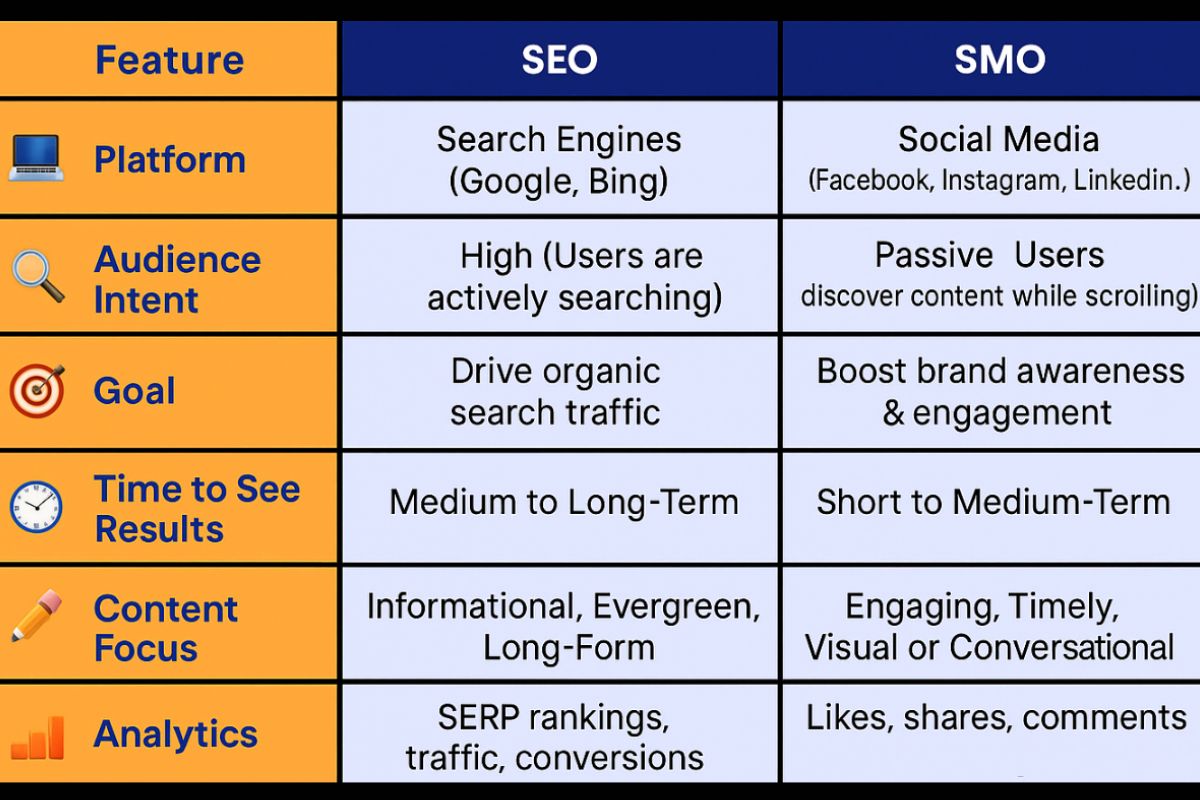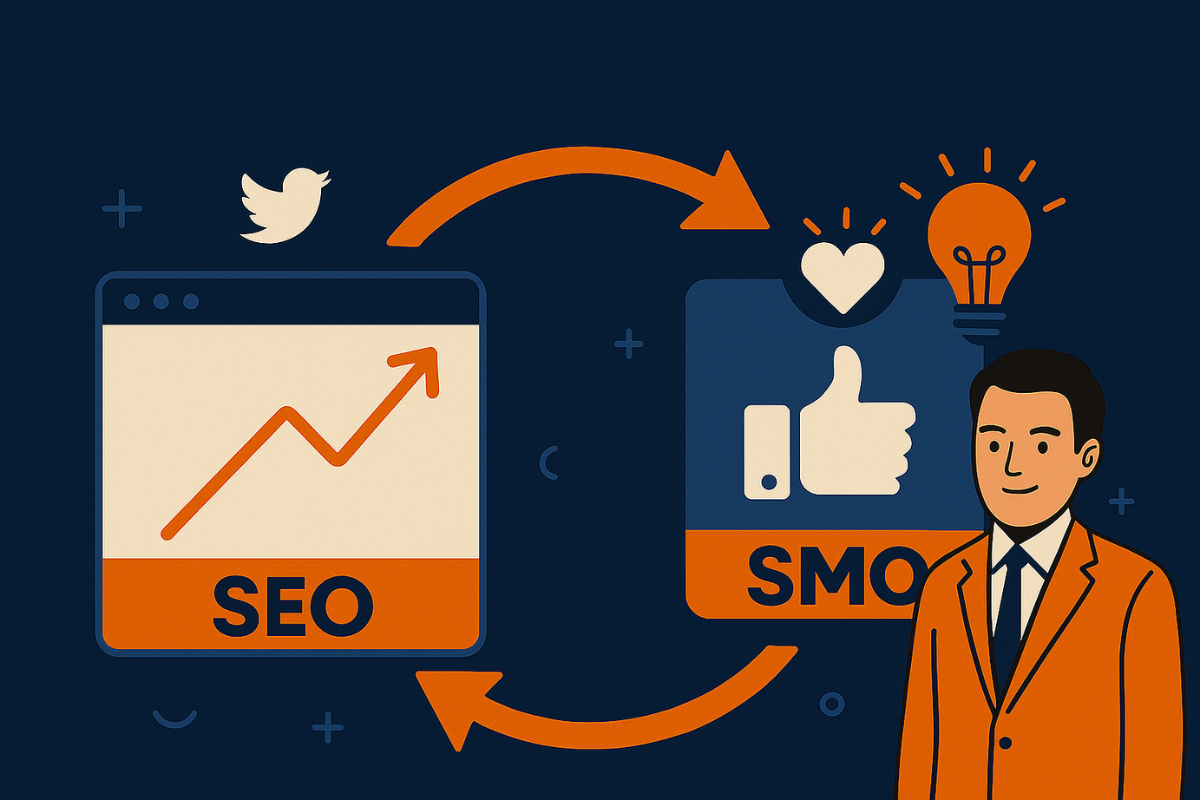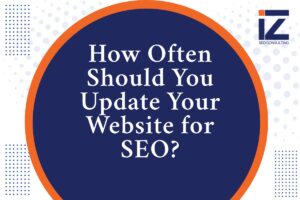In today’s zooming digital marketplace, getting visibility is more than just being present. It is more about being found, followed, and selected over other competitors.
It is no secret there are 2 main competitors dominating the scene: Search Engine Optimization (SEO) and Social Media Optimization (SMO). Both are intertwined but approach the goal differently. More precisely, they come from different angles in terms of timelines and budgets.
Knowing the differences is more important than allocating the right resources. In this guide, we will give you the details and the approaches to one smart resource allocation, especially for the SEO and SMO of the most competing and dominating brands.
What Is SEO and SMO in Digital Marketing?
Before getting started, we will establish the definitions for the 2 main competitors dominating the digital marketing.
SEO stands for Search Engine Optimization.
SEO is practicing to create increasing visibility of the site, to as many organic search engines as possible. When someone searches, for example, I want the best accounting software for a small business, SEO is what determines whether your site is on page 1 or on page 10.
Core SEO components:
- Keyword Optimization
- Mapping keywords to actual search queries your customers use to find your products or services.
- Technical SEO
- Site speed – <2.5 seconds
- Mobile responsive
- Crawlable
- Content
- Content should address search expectations better than your competitors.
- Authority
- Achieved via backlinks from reputable domains.
- On-Page SEO
- Title tags
- Meta descriptions
- Headings
Basic principle: SEO fulfills demand already present. Users search with intent, often with credit cards ready.
SMO (Social Media Optimization)
SMO aims to maximize visibility, engagement, and traffic from social media channels. Unlike the search-driven approach of SEO, SMO builds awareness and relationships where the audience spends their time scrolling.
Core components include:
- Platform Optimization
- Consistent branding and complete keyword-optimized profiles.
- Content Strategy
- Adapting to the specific platform (Reels for Instagram, carousels for LinkedIn)
- Engagement
- Comment responses and trending topics.
- Community Building
- This generates loyal followers who spread your message.
- Paid Media
- to boost reach beyond the limits of organic.
Basic principle: SMO builds demand where none exists. It interrupts scrolling with content so interesting that people have to stop, engage, and remember your brand.
Understanding the difference between SMO and SEO requires looking beyond the tactics to the fundamental mechanics driving each channel.
The important lesson here is that these are not competing channels; they exist at different levels of the customer journey.
SEO vs SMO: The Core Differences
Wrapping your head around the SMO and SEO difference starts with identifying how and where each strategy operates. Here’s a comparison to help clarify how these two are different:

In essence, SEO and SMO are not competitors; they’re complementary. But which one gives better returns?
Which Is Better SEO or SMO?
Choose SEO as Your Priority If You:
- Work in high-consideration categories (B2B software, professional services, healthcare)
- Sell products that people search for by name or by category
- Want traffic of high sustainability, that remains in the absence of ad spend, and that is compounded over time
- Can wait 6–12 months for returns that are significantly positive
- Compete in the areas where expertise and trust lead to conversions
- Have a content budget that is higher than $2,000–$10,000 monthly
Example: A B2B SaaS company selling project management software. Ideal customers search the term, “project management software for remote teams,” (high-intent search), which has a 5–15% conversion rate. SEO captures this demand at the exact moment buyers are comparing options.
When SMO Should be Your Priority:
- Launch new products with no pre-existing search volume (it’s a new product, and no one knows to search for it yet).
- Operate in categories that are very visual (fashion, food, travel, entertainment)
- Needs immediate visibility (time-sensitive campaigns or time-sensitive product launches)
- Consistently create and publish good, engaging content (typically 3 to 7 times a week)
- Year support target audience members (if your target audience is younger and they tend to discover brands via social feeds)
- Have a limited budget but good in-house strong content-creation capability
- Supporting a community (building a community) is part of your business objectives.
Example: sustainable fashion brand. You launch a new collection. No one knows how to search for your brand yet. SMO builds brand and community awareness via Reels on Instagram and potentially engages community members who will search for your brand directly, which is a community-driven search that will support your SEO in the future.
Budget Reality Check
SEO realistic first-year investment:
- Technical audit and fixes: $3,000 to $15,000
- Content creation and production: $2000 to $8000 a month
- Link building: $1000 to $5000 a month
- Total: $30,000 to $120,000
- Month 6-18 of ROI
SMO realistic first-year investment:
- Content creation: $1500 to $6000 a month
- Paid social amplification: $500 to $5000 a month
- Design and other tools: $500 to $2000 a month
- Total: $18,000 to $120,000
- Month 1-6 of ROI
If you have a limited budget, SMO will deliver results faster. But if you can withstand the investment period for SEO, the results are typically much larger in comparison to SMO.
How SEO and SMO Create Multiplier Effects

Elite brands parted ways with the endless debates on whether SEO or SMO are more important long ago, and instead, set up systems where each amplifies the other.
SMO Engagement Signals Enhance SEO Rankings
Although engagement signals are not direct ranking mechanisms, the snowball effects of engagement are. High engagement leads to visibility, and subsequently more visits to the site, increasing time spent on the site, and reducing the bounce rate, which are all signals Google rewards with better rankings.
SEO Fuels SMO
Blog posts that are most likely to get clicks provide insight into what the audience wants to see. Use that information to create, and/or recycle, content into LinkedIn carousels, Instagram Reels, Twitter Threads, and YouTube Videos. Pay attention to which blogs get the most engagement on social media and prioritize those topics on your content calendar.
Optimized Social Profiles Enhance Branded Search Results
When people search for your company name, social profiles that are optimized for search mean that you control 5-10 of the top results. This is digital real estate, and it is something you cannot afford to overlook.
Social Listening Guides SEO Keyword Strategy
Social Media provides the audience with research keywords do not. Don’t just look for the keywords that are suggested, search for the audience and find the questions people are asking in the comments, the trending posts, the problems people are discussing in Reddit, the etc. flour.
Cross-Channel Reinforcement Builds Authority
When potential customers encounter your brand across multiple channels, they see you as more established and trustworthy. This is critical for understanding how to strengthen your brand in more competitive markets; this is how SEO works. From seeing your post on LinkedIn to watching your video on YouTube, and finding your article in a search, they will perceive you as an authority.

Common Mistakes That Kill Integration
Mistake 1: Siloed Teams and Metrics
Your SEO team celebrates a 30% increase in traffic, while your social team is still upset about a 15% drop in reach. No one knows that the social team’s viral post is the one that drove that organic spike. Solution: Shared dashboards and weekly cross-functional meetings.
Mistake 2: Neglecting the Nuance
Understanding search engine optimization and social media marketing too broadly creates confusion. Seeing SMO as one component of social media marketing helps clarify that it’s focused on optimization, not on ads or an influencer partnership.
Mistake 3: Chasing Vanity Metrics
10,000 followers on Instagram mean nothing if none of those followers convert. Ranking on page one for a keyword that no one searches is pointless. Solution: Establish success metrics that are connected to the value of the outcomes that the business is trying to achieve (leads, sales, and qualified traffic).
Mistake 4: Inconsistency
Going from posting daily to going silent for a month kills social media momentum. Publishing 10 blog posts in January, then going silent until June, thanks your SEO progress. Solution: Stay consistent. Give yourself a goal you can stick to for the long term. Start small and maintain consistency over intensity.
Seeing Success: KPIs Which Matter
Stop tracking everything. Focus on metrics which connect to revenue.
Important SEO KPIs
- Organic traffic growth on both a month-over-month and a year-over-year basis
- Keyword rankings for money terms (not for branded keywords alone)
- Conversion rate with organic traffic
- Trends in domain authority
- Quality (not quantity) of backlinks
Important SMO KPIs
- Engagement rate (likes + comments + shares /total reach)
- How quickly the follower count goes up (percentage increase)
- Referral traffic to website from social
- Conversion rate from social
- Brand mention volume and sentiment
Mixed Integration KPIs
- Assisted conversions (social touchpoints in the conversion path)
- Content ROI (revenue attributed / production cost)
- Customer acquisition cost by channel
- Brand search volume (are more people searching your brand after social campaigns?)
Strategies by Industry
E-commerce
Primary focus SEO (60%) + SMO (40%)
Product searches drive revenue. Still, social commerce features and influencer partnerships make SMO essential for product discovery.
B2B SaaS
Primary focus: SEO (70%) + SMO (30%)
Long sales cycles mean capturing bottom-funnel search intent is crucial. LinkedIn SMO builds thought leadership that warms leads for conversion.
Local Services
Primary focus: SEO (50%) + SMO (50%)
Local SEO captures “near me” searches. Social media builds community loyalty and showcases visual proof.

The Importance of Professional Guidance
In most cases, businesses underestimate how much expertise is needed for enterprise SEO strategy and high-level SMO.
Initially, DIY strategies can be helpful, but they reach a growth plateau as a result of a lack of technical SEO, an underdeveloped content strategy, and a lack of skills regarding link building, social media (on specific platforms), and data analysis.
The tipping point of success is reached when revenue per month surpasses $50,000, or if you’re spending $3,000 or more each month on content. At this point, professional consultation will likely result in a $3-5 return on the investment more so than a DIY approach.
FAQs: Quick Answers to Related Questions
Yes, especially in companies with fewer than 50 employees. However, once you cross the $5 million revenue mark, it’s best to bring in some specialist-level expertise, ideally coordinated through a director role, because it tends to perform much better than having a generalist.
SMO: You will see engagement in a few days, follower growth in a few weeks, and consistent brand awareness in 2-3 months.
SEO: You can expect to see keyword ranking movement in 3-4 months, an increase in significant traffic in 6-9 months, and a consistent return on investment in 12-18 months.
Nope. Google has confirmed that social signals do not affect rankings directly. Indirectly, however, are significant: visibility leads to traffic, engaged users improve rankings, and being visible socially leads to gaining backlinks.
SEO takes a minimum of $2,000-$3,000 a month for 6 to 12 months. That’s $12,000-$36,000 of investment before seeing anything significant.
For SMO, it’s $1,000 to $2,000 a month for 3 to 6 months, which will get you $3,000 to $12,000 of investment before seeing stable growth.
B2B services/SaaS: LinkedIn (45% higher conversion rate)
E-commerce/DTC brands: Discovery on Instagram and TikTok
Local services: community on Facebook and Instagram
Thought leadership: LinkedIn and X (Twitter)
Don’t get stretched too thin. Focus on dominating 1 platform before you expand.
The first thing to state is that the quality of the first state should be in excess of the average before pummeling the rest with posts.
Minimum sufficient: 3 quality posts for the week on the platform, with the most important focus.
Growth phase: 5-7 quality posts for the week.
No posts for a week with quality, engaging content beats optimal posts for the week with bland, casual content.
Take Action: Your Next Steps
Debating which is better SEO or SMO keeps you stuck in analysis paralysis while competitors capture market share.
This week:
- Audit your SEO foundation using Google Search Console
- Review your social profiles—are they complete and optimized?
- Identify your top 3 business objectives
This month:
- Choose your primary focus based on timeline and budget
- Create your first integrated content piece (blog post + 10 social adaptations)
- Establish baseline metrics to measure progress
This quarter:
- Track metrics weekly, adjust monthly
- Double down on what works, cut what doesn’t
- Build consistency in content production
When you’re ready for expert guidance:
When your business has outgrown DIY tactics or you’re investing $3,000+ monthly in marketing, professional SEO expertise multiplies results. Indexed Zone SEO specializes in technical SEO excellence and comprehensive content strategies that drive sustainable organic growth while complementing your social media efforts.
While SMO requires consistent in-house execution or a dedicated social team, a strong SEO foundation amplifies everything else you do, creating the authority and visibility that makes your social content more effective.
The bottom line: Businesses that dominate their markets don’t ask whether to invest in SEO or SMO. They ask how to orchestrate both for maximum competitive advantage. Stop choosing sides. Start winning on both fronts.



